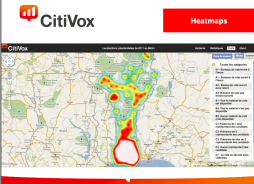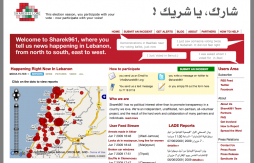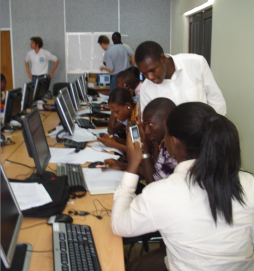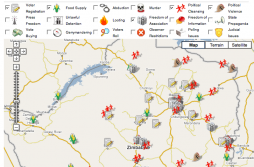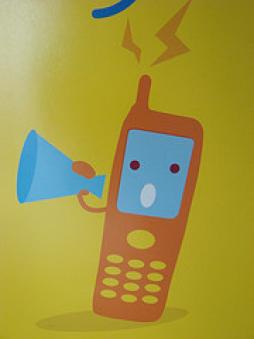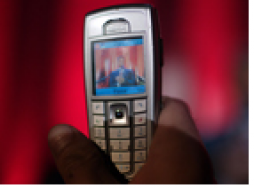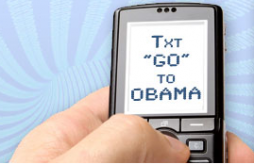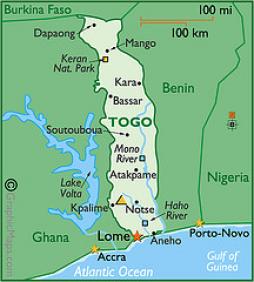election
Posted by admin on Aug 22, 2011
At MobileActive.org, we often write about mobile-based projects that other organizations and practitioners in the field carry out. We don't often highlight our our own mobile project implementations or discuss our own challenges and lessons, as many are sensitive in nature. Here, however, is a project we can talk about.
As part of a USAID-funded project, MobileActive.org provides new media consulting to NGOs and independent media organizations in developing countries to enhance their communication and coordination efforts. We work in countries as diverse as Zimbabwe, Bosnia, and Peru, Egypt, Guatemala, and Serbia. Recently, we assisted an organization in Benin, West Africa, implement an SMS election observation project. 300+ trained observers took part in monitoring the presidential and legislative elections in March and April 2011.
| In Benin, SMS Election Observation and Lessons data sheet 1995 Views |
| Countries: |
Benin
|
Posted by MelissaUlbricht on Apr 27, 2011
One of the largest parallel vote tabulation efforts is under way right now in Nigeria to observe and monitor gubernatorial elections. Project 2011 Swift Count is observing the national assembly, state assembly, and gubernatorial elections with 8000 trained election observers. The observers are also working across six high-priority states to complete parallel vote tabulations to verify the official results in six corresponding gubernatorial elections.
At around 9pm in Nigeria on election day, MobileActive.org spoke with Chris Doten, senior program officer on the ICT team for the National Democratic Institute (NDI). When we spoke with Doten, two-thirds of trained election observers had sent in via text message final vote counts, meaning the final tallying was complete at that particular polling place. A much higher percentage of observers have sent in summaries of total ballots cast.
| 8000 Observers Report on Nigerian Elections via Text Message data sheet 3246 Views |
| Global Regions: |
|
| Countries: |
Nigeria
|
Posted by MarkWeingarten on Feb 14, 2011
The Sudan Vote Monitor - Preliminary Report data sheet 3117 Views
Author:
The Sudan Institute for Research & Policy
Abstract:
The purpose of the Sudan Vote Monitor (SVM) project was to utilize simple information and communication technology (ICT) tools in the independent monitoring and reporting of the Sudan national elections held in April 2010. This initiative built on the successful recent experience of civil society organizations (CSOs) and volunteers in several countries (e.g., Ghana, India, Sierra Leone, Montenegro) in harnessing ICT to support the conduct of fair and credible elections. The project’s primary focus is the process of observing and reporting rather than the election results or their implications as significant as these are. Accordingly, SVM, and this report, is only concerned with the reporting activity with no regard to the political climate or political orientation of reporters, CSOs,or candidates. The main objective is to cooperate with and facilitate technological knowhow for civil society organizations in the Sudan (grassroots and other NGOs, media organizations, journalists, and interested private citizens and individuals in general).
The project was led by SIRP in collaboration with Asmaa Society for Development and several other Sudanese NGOs, with technical support from eMoksha.org, Ushahidi.com, and Khotawat Consultancy. During the April national elections, the Sudan Monitor website enabled reporting of the election process by many different organizations and individuals. Through the use of open source software civilians in Sudan were able to report general observations or irregularities via e-mail, short code text message (SMS), or by logging on to the Internet and visiting the sudanvotemonitor.com website. Using the Ushahidi platform reports could be aggregated along with direct feeds from news sites, blog posts, photos, videos and tweets related to the elections from all relevant sources, in one place, on an interactive map. Users had up-to-date information including streaming video from election centers or polling stations around the Sudan, and were able to comment and rate the credibility of the submitted reports in collaborative manner. The site was accessible to all individuals and organizations regardless of their political affiliations or views. The reporting facility was available for public reporting from April 10 to April 30, 2010.
Posted by PrabhasPokharel on Aug 19, 2009
Af the Afghani elections are coming up this week, there are a projects focusing on the election and citizen media coverage that we like to note.
First, as Taliban has intensified violence and has threatened to disrupt the elections and "kill those who vote," the Afghani government has called for reporters to avoid coverage of violence so that Afghanis aren't scared away from polling stations. Meanwhile, associations such as the Independent Journalist Association of Afghanistan have refused to take the order and has promised to continue reporting. The ban on reporting is phrased as a "request" in English, and as "strictly forbidden" in Dari (good synopsis of ban and violence here).
Posted by KatrinVerclas on Jun 07, 2009
Sharek961 is another effort in Lebanon to monitor the election there today on June 7. Unlike LADE which uses more than 2,000 trained volunteer election monitors to systematically report from polling stations throughout the day, Sharek961 aims to get ordinary Lebanese citizen to text, call, and email in incidences from polling stations, crowdsourcing the conduct of the critically important election there.
According to Sharek961's press release,
"Sharek961.org [is[... empowering citizens to report in Arabic and in English, through four means; SMS, email, Twitter and web reports. Reports can address anything election-related happening around the country, from political rallies and polling queues to vote-buying and violence. Sharek961 anonymously publishes these reports alongside news reports, blog posts, photos, videos and tweets, on an interactive map, making them publicly available to all citizens, media outlets, and organizations."
Sharek961 notes that it
Posted by KatrinVerclas on Jun 05, 2009
Lebanon will hold a critically important parliamentary election on June 7, and election observers from around the world have descended on the country. However, as in many other countries now, there are local organizations and citizen efforts on the ground that are using mobile technology for sophisticated election observation efforts. The Lebanese Association for Democratic Elections (LADE) and the Coalition Libanaise pour l’Observation Elections (CLOE), for example, have put in place an extensive SMS reporting system, for example. LADE will deploy a total of 2,500 volunteer citizen observers throughout the country directly at the 5181 polling stations.
Posted by KatrinVerclas on Dec 07, 2008
The CODEO Election Observation Center for the all-important 2008 Ghanaian election is a busy place. Data operators are sitting on rows of computers monitoring incoming SMS messages from 1,000 polling stations around the country. Mobile phones are ringing constantly with calls from the observers in the field. Maps of the 230 constituencies in Ghana adorn the walls of the modern building at the Kofi Annan International Peacekeeping Training Center in Accra.
The Observation Center, affectionately called the "OC" by CODEO staffers, is the technology hub of the massive amounts of qualitative and vote count data that is pouring in from the more than 4,000 election observers deployed by CODEO, the Coalition of Domestic Election Observers. This makes it by far the largest deployment of election observers in this year's election. Mobile technology, and text messaging in particular, is playing a critical piece in relaying both qualitative data on how the election is being conducted, and quantitative data that will verify the official results issued by the Ghanaian Election Commission.
Posted by KatrinVerclas on Mar 27, 2008
Zimbabwe is going to the polls on Saturday and candidates there have made extensive use of mobile phones to get their message out. In what is likely going to be a fraught election with poll irregularities and violence feared, the three main candidates are nonetheless using mobiles to engage their supporters and get them to the polls.
Zimbabweans, faced with a state-controlled media with few independent outlets, are also using text message jokes to express their opinions, as we have reported previously here at MobileActive.org. According to the Voice of America, "One of the most popular messages, at the moment, among Mutare residents is one that reads "President Robert Mugabe should be sent to farm, while Morgan Tsvangirai of the opposition movement For Democratic Change should be sent to school... And [former ruling party finance minister] Simba Makoni must be allowed to rule."
The message is believed to the brain child of Makoni's backers."
The joke refers to Mugabi's controversial land reform, and candidate Twvangirai's limited formal education.
Posted by CorinneRamey on Feb 26, 2008
MobileActive has aggregated dozens of videos focused on the use of mobile phones in civil society on our new MobileActive YouTube channel.
The MobileActive channel features playlists about mobile phones used in a variety of different fields. On the Mobile Phones in Advocacy playlist, you can watch videos about Greenpeace Argentina's work to pass the Ley de Bosques (Forest Law) by using mobile phones and an advertisement for FishMS, a South African SMS infoline that allows users to text in the names of fish and get a rating about their environmental sustainability. Watch the Mobile Phones in Global Development channel for videos on mobile banking, the Village Phone program, and the growth of mobile phones in the developing world. Check out the Mobile Phones in Human Rights playlist for a variety of videos of human rights abuses taken on mobile phones, including the mobile videos of Egyptian police brutality by blogger Wael Abbas.
Other MobileActive YouTube playlists include Mobile Phones in Citizen Media, Mobile Phones in Disasters and Relief, Mobile Phones in Education and Learning, Mobile Phones in Elections and Participation, Mobile Phones in Poverty Alleviation, and many others.
Check out the new MobileActive YouTube channel and add your videos on the mobile revolution!
Posted by CorinneRamey on Feb 17, 2008
Limbo, a mobile marketing company, provided three of the U.S. presidential candidates with free mobile advertising. The goal was to measure how voting intentions and perceptions change with SMS advertising.
The results were surprising, Limbo's Chief Marketing Officer Rob Lawson told MobileActive. SMS advertising changed the "voting intentions" of 28% of the people who received the messages and about 14% of recipients said they viewed the candidates more positively after the campaign. "I was surprised by the impact on voting intention," said Lawson. "I thought people would be comfortable receiving them, but I didn't think it would cause them to pay more attention to the candidates."
Posted by CorinneRamey on Feb 05, 2008
This February 5th isn't just any Tuesday in the United States. It's Super Tuesday, so named because 23 of the 50 states are holding presidential primaries, making it the contest that could potentially determine the all-important presidential Democratic and Republican nominees.
Television station MTV (Music Video Television) has an innovative new effort to get out the youth vote and merge citizen journalism with mainstream media. The effort, dubbed "Street Team '08," is made possible through mobile phones.
Posted by KatrinVerclas on Jan 18, 2008
Political ringtones, wallpapers, and SMS election updates are part and parcel of election campaigns in countries around the world -- from Spain to Kenya to the Phillipines, from Argentina to the Ukraine. It is has taken until this year's presidential election, however, for political contenders the United States to catch up.
Posted by admin on Oct 13, 2007
The government of Togo has banned the use of SMS by the Rally of the Togolese People (RPT), the Togolese ruling political party, reports Highway Africa News Agency. The High Authority for Audiovisual Communications (HAAC), a press regulation body, has prohibited the messages because voters viewed the SMS as intimidation, calling them "unfair propaganda" and an "illicit practice."
According to the News Agency, voters had complained about unsolicited SMS messages received from the RPT in view of the upcoming legislative election on this Sunday, October 14. Supposedly, part of the message read, "To maintain the current dynamics of reconciliation and economic growth and social stability, vote RPT." The HAAC "has asked the country's political parties to follow the law or face the wrath of the law."
Posted by KatrinVerclas on Apr 10, 2006
SMS messages were in wide use in the recent Thai elections, both officially and inofficially.
In preparation for Thailands snap election last week, Thailand's Election Commission sent text messages to 25 million cell phone customers politely reminding them to vote. The message read: "You are cordially invited to exercise your right to vote on February 6, between 8 am and 3 pm."
At the same time, the Nation, a Thai newspaper, reported recently on a text message campaign among voters urging them to bring a a pen with them to mark their ballots.
The SMS stated: "Don't use the rubber stamp provided [by the authorities] to prevent fakes. Tell all your friends too."
